Learn about Ephesus, a pivotal city in the New Testament and the third largest in the Roman Empire, through this intriguing Bible map exploration.
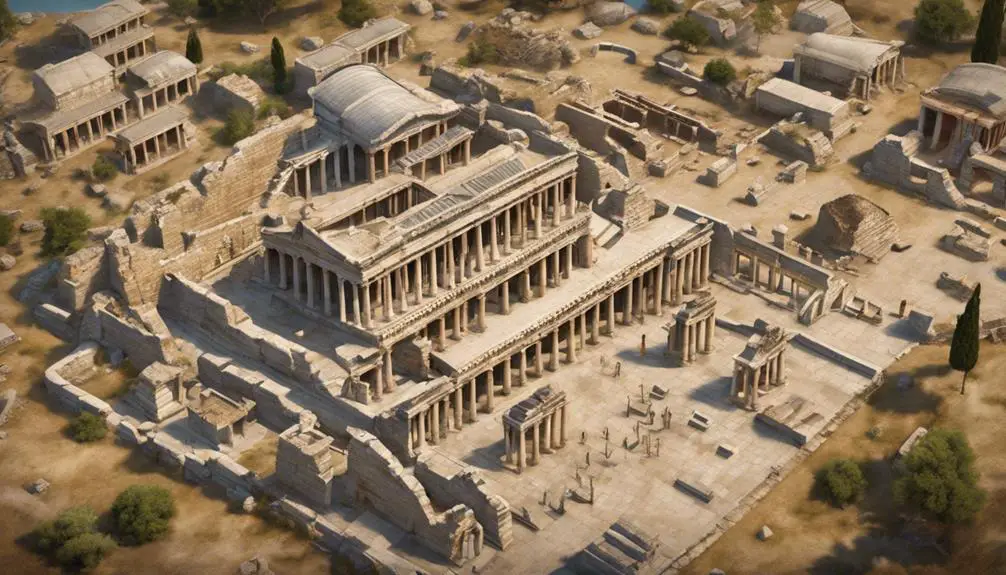
Ephesus in the Bible Map
Did you know that Ephesus, a key location on any Bible map, was one of the largest cities in all of the Roman Empire, ranking third behind Rome and Alexandria?
As you explore the significance of this ancient city, you'll uncover its rich presence in the New Testament, the notable biblical figures who walked its streets, and the stunning archaeological sites that shed light on its past.
So, why not embark on this fascinating journey into history and faith, where every turn holds a new discovery?
Key Takeaways
- Ephesus, a prominent city in the Roman Empire, played an integral role in propagating early Christianity.
- Notable biblical figures like Paul, Priscilla, Aquila, Apollos, and Timothy left substantial footprints in Ephesian history.
- Important archaeological sites in Ephesus like the Grand Theatre, Terraced Houses, and Library of Celsus reveal its rich past.
- Ephesus, being a spiritual hub, hosted significant religious events and was a center for both Christian and Artemis worship.
Historical Significance of Ephesus
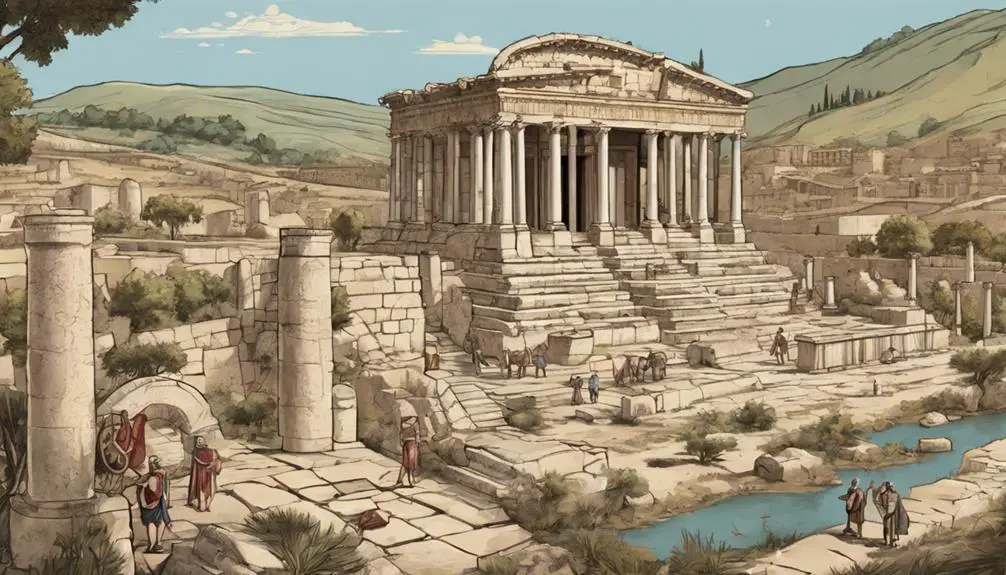
Ephesus, a significant city in the Bible, holds a rich tapestry of history that's deeply intertwined with early Christian development. This ancient city, now modern-day Turkey, was a beacon of Roman influence, acting as a major trade and religious hub during the Roman period. Walking the streets of Ephesus, you're transported back in time, amidst grandiose ancient architecture that echoes Roman mastery.
The city's layout and buildings, such as the Library of Celsus and the vast amphitheater, projecting the power of the Roman Empire, show how the Romans shaped Ephesus. It's through their architectural prowess that you can grasp the significance of Ephesus as a center of commerce, religion, and culture, fostering early Christianity's growth.
Furthermore, Ephesus, with its well-preserved ruins, provides an invaluable lens into the past. It helps you understand the dynamics of the Roman Empire and its influence on the Mediterranean world. These ruins, a testament to Roman engineering, emphasize the critical role Ephesus played in the expansion of Roman civilization.
Ephesus in the New Testament
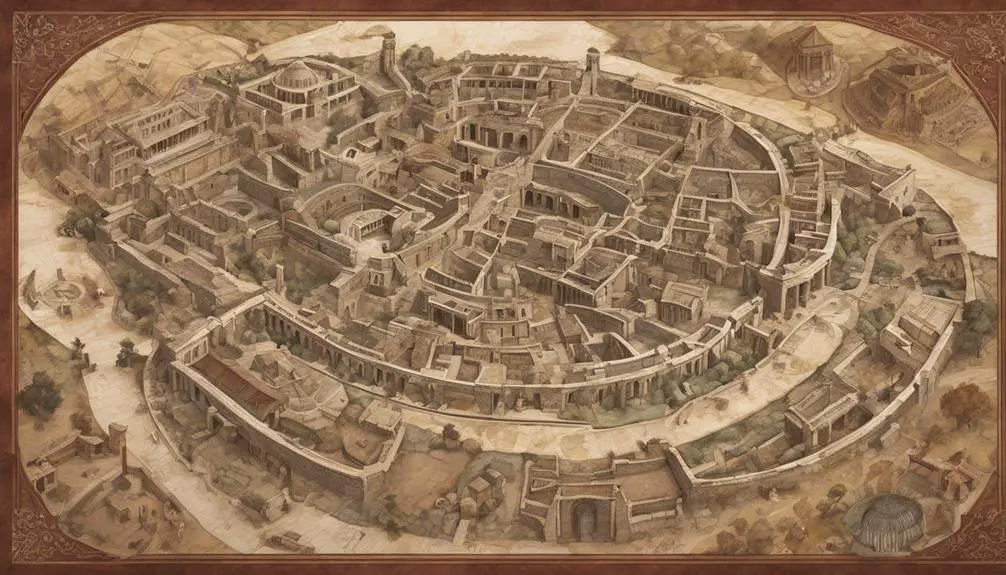
While delving into the New Testament, you'll notice that Ephesus emerges as a pivotal location, playing a crucial role in the spread and development of early Christianity. Ephesus is particularly significant due to the Ephesian converts and the influence of Paul's Letters.
As a hub of the Christian faith, Ephesus was a focal point of Paul's missionary journeys. He spent considerable time there, nurturing the Ephesian converts and establishing a strong Christian community. His influence didn't end with his physical presence; Paul's Letters to the Ephesians are foundational texts of the New Testament, providing guidance and teachings that helped shape early Christian theology.
Let's take a closer look at some of the key events and features linked to Ephesus:
Events |
Description |
|---|---|
Paul's Stay |
Paul lived in Ephesus for over two years, preaching and converting many Ephesians to Christianity. |
Paul's Letters |
Written to the Ephesian Christians, they offer teachings on unity, grace, and spiritual maturity. |
Ephesian Converts |
These were the first followers of Christ in Ephesus, playing a crucial role in the growth of Christianity. |
Ephesian Theater |
This was a prominent location in Ephesus, where Paul often preached his teachings. |
In understanding Ephesus, you're gaining insight into the roots of early Christianity.
Notable Biblical Figures in Ephesus
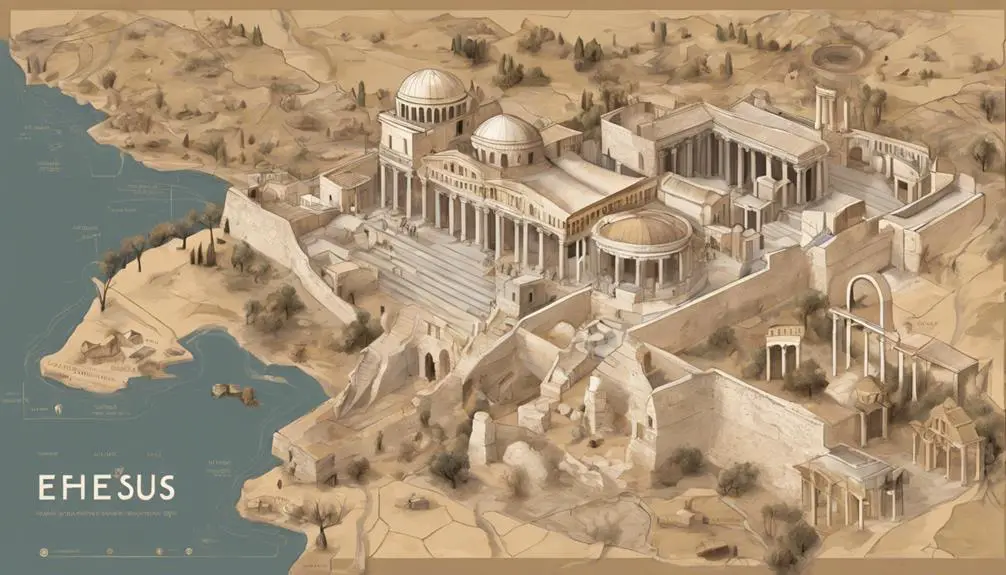
In the rich tapestry of Ephesus's biblical history, several key figures stand out for their significant contributions to the development and dissemination of Christianity in the city.
Paul's influence in Ephesus is perhaps most remarkable. As an apostle, his teachings played a pivotal role in shaping the faith of the Ephesian believers. His letters to the Ephesians remain a key component of the New Testament, reflecting the struggles and triumphs of early Christianity.
In your exploration of Ephesus's biblical past, you'll encounter several notable figures such as:
- Paul: His powerful preaching and tireless efforts significantly impacted Ephesian believers.
- Priscilla and Aquila: This couple played a crucial role in supporting Paul's mission in Ephesus.
- Apollos: A fervent advocate of the faith, Apollos enhanced the understanding of the Ephesian believers.
- Timothy: As the Bishop of Ephesus, he worked tirelessly to fortify the faith of the Ephesian church.
- John the Apostle: His exile to Ephesus and his writings have profound historical significance.
These figures, through their faith and actions, shaped the development of Christianity in Ephesus, leaving a lasting legacy that echoes through the ages.
Archaeological Sites in Ephesus
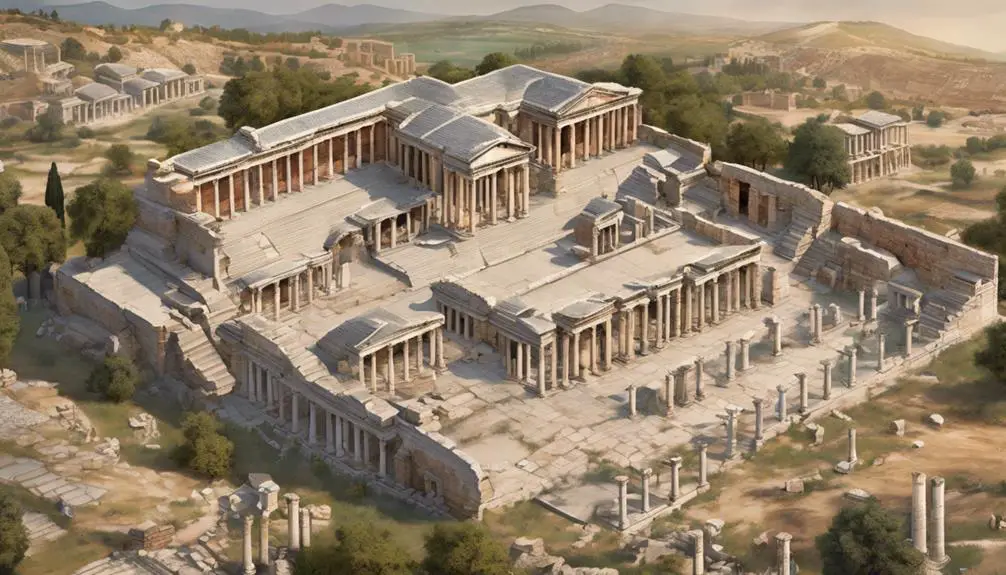
Shifting our focus from the pivotal biblical figures to the physical remnants of the past, let's explore the archaeological sites that bear witness to Ephesus' rich history and cultural heritage. The Ephesus Excavations Discoveries have provided an invaluable insight into the Ancient Ephesian Lifestyle, and the city's archaeological richness is nothing short of extraordinary.
The excavations in Ephesus have unearthed numerous artefacts, monuments, and structures. The Grand Theatre, for instance, is a testament to the Ephesians' architectural prowess and love for arts. Here, you can almost hear the echoes of ancient performances, seeing the past come alive.
The Terraced Houses provide a glimpse into the everyday life of the Ephesians. Their intricate mosaics and frescoes reveal a society that highly valued art and beauty. You can almost imagine the bustling activity that once filled these homes, demonstrating how history isn't just about grand events, but also about the daily lives of ordinary people.
The Ephesus Excavations Discoveries have also unearthed the Library of Celsus, a symbol of Ephesus as a city of learning. This iconic structure showcases the Ephesians' dedication to knowledge and the intellectual pursuits of their time.
These archaeological sites form a tangible connection to Ephesus' past, bridging the gap between then and now.
Ephesus: A Spiritual Journey
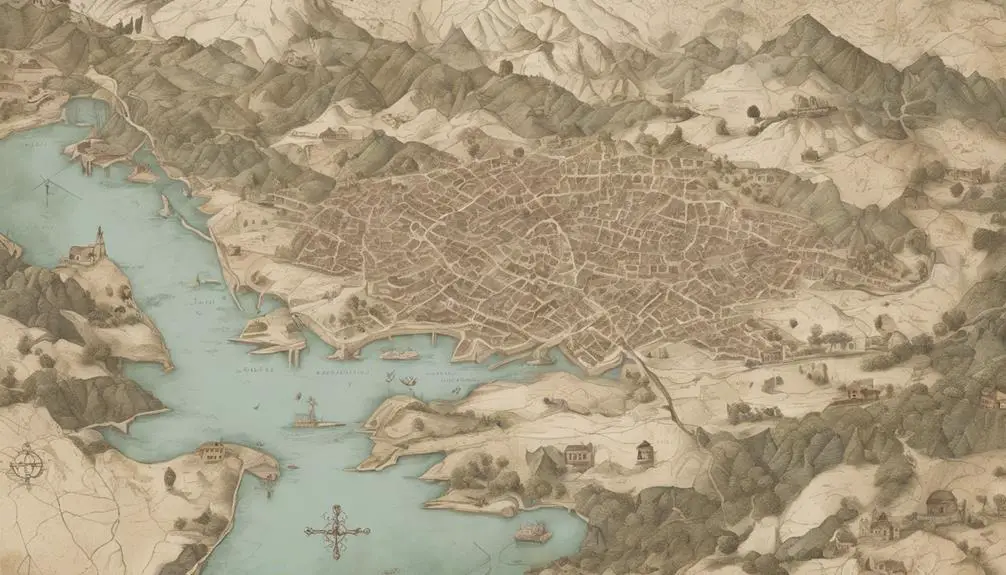
Stepping into Ephesus, you're not just entering an ancient city, but embarking on a profound spiritual journey that's deeply rooted in biblical history. This journey goes beyond mere sightseeing, it's a quest to unravel the Ephesian Mysteries and understand their Spiritual Symbolisms.
As you traverse this spiritual labyrinth, remember:
- Ephesus was a stronghold of early Christianity, it's believed Apostle Paul wrote his letter to the Ephesians here.
- The city was a center for the worship of Artemis. The Temple of Artemis, one of the Seven Wonders, held religious significance.
- The 'Terrace Houses' portray religious life in Ephesus, depicting biblical scenes in mosaics.
- The 'Cave of Paul and Thecla' is thought to have been a place of Christian pilgrimage.
- Ephesus was the site of the Third Ecumenical Council, which shaped Christian doctrine.
Your exploration of Ephesus isn't just a walk through an ancient city, it's a spiritual journey, an opportunity to delve into the mysteries and symbolisms of the Ephesian faith. These spiritual insights can't be found on a regular map, they're etched into the very stones of Ephesus.
Frequently Asked Questions
What Are Some Recommended Travel Guidebooks for Visiting Ephesus?
You're looking for guidebooks to enhance your visit to Ephesus. Consider 'Ephesus: The Ultimate Guide' for a deep dive into Ephesus artifacts and ancient architecture.
'The Complete Guide to Ephesus' is another great choice, with detailed descriptions of historical sites. Both offer comprehensive insights into the rich history and stunning architecture, helping you appreciate Ephesus beyond its biblical context.
Can You Provide Details About the Climate and Best Time to Visit Ephesus?
Ephesus' climate is Mediterranean, with hot summers and mild winters. You'll find the best time to visit is spring or fall, avoiding the summer heat and tourist crowds.
Here, you'll marvel at the ancient architecture, and Ephesus' wildlife is a bonus. However, dress for warm weather and wear comfortable shoes as the historical sights involve a lot of walking.
Always remember to respect the wildlife and the historical site for future visitors to enjoy.
What Other Attractions Are Near Ephesus That Tourists Can Visit?
Aside from Ephesus, there's a plethora of nearby attractions you might enjoy.
You can indulge in Ephesus Culinary Experiences, offering you a taste of local cuisine.
If you're a beach lover, there are numerous nearby beach destinations offering sun, sand, and sea.
It's not all about the past, you can make the most of the present too.
What Are the Accommodation Options Available Near Ephesus?
When you're planning your visit to Ephesus, you'll find various accommodation options.
You can explore local hotels that offer an Ephesus Cuisine Exploration for a taste of the region's food.
Or, you might opt for accommodations that highlight the Historical Ephesus Architecture.
There're also guesthouses and vacation rentals if you're looking for a more homely feel.
It's important to choose a place that fits your needs and enhances your visit.
Are There Any Local Traditions or Customs That Tourists Need to Be Aware of When Visiting Ephesus?
When visiting Ephesus, you'll need to respect the cultural etiquette. It's traditional to dress modestly at religious sites. Also, don't refuse an offer of çay (tea), it's a big part of Turkish hospitality.
Try local dishes, like gözleme or ayran, to engage with the local culture. Remember, it's not just about seeing the historical sites; it's about immersing yourself in the tradition and customs of the area too.
Conclusion
You've journeyed through Ephesus, a key biblical landmark, witnessing its historical significance and New Testament references.
You've met notable figures who walked its streets and explored its archaeological treasures. Ephesus isn't just a dot on a map, it's a spiritual journey.
It's a testament, reminding us of our faith's rich, complex history. So, whenever you read your Bible, remember Ephesus, and let its story deepen your understanding of your spiritual heritage.



Sign up